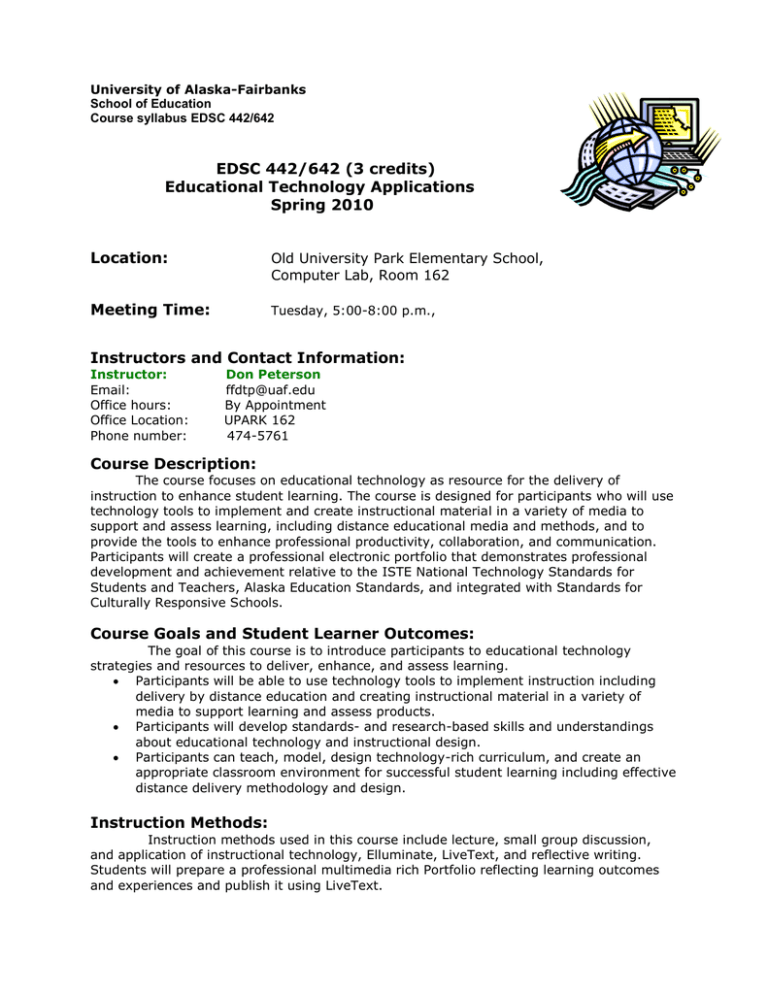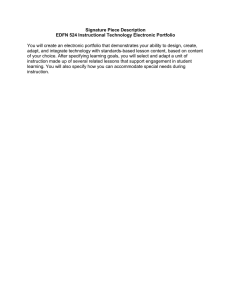EDSC 442/642 (3 credits) Educational Technology Applications Spring 2010
advertisement

University of Alaska-Fairbanks School of Education Course syllabus EDSC 442/642 EDSC 442/642 (3 credits) Educational Technology Applications Spring 2010 Location: Old University Park Elementary School, Computer Lab, Room 162 Meeting Time: Tuesday, 5:00-8:00 p.m., Instructors and Contact Information: Instructor: Email: Office hours: Office Location: Phone number: Don Peterson ffdtp@uaf.edu By Appointment UPARK 162 474-5761 Course Description: The course focuses on educational technology as resource for the delivery of instruction to enhance student learning. The course is designed for participants who will use technology tools to implement and create instructional material in a variety of media to support and assess learning, including distance educational media and methods, and to provide the tools to enhance professional productivity, collaboration, and communication. Participants will create a professional electronic portfolio that demonstrates professional development and achievement relative to the ISTE National Technology Standards for Students and Teachers, Alaska Education Standards, and integrated with Standards for Culturally Responsive Schools. Course Goals and Student Learner Outcomes: The goal of this course is to introduce participants to educational technology strategies and resources to deliver, enhance, and assess learning. Participants will be able to use technology tools to implement instruction including delivery by distance education and creating instructional material in a variety of media to support learning and assess products. Participants will develop standards- and research-based skills and understandings about educational technology and instructional design. Participants can teach, model, design technology-rich curriculum, and create an appropriate classroom environment for successful student learning including effective distance delivery methodology and design. Instruction Methods: Instruction methods used in this course include lecture, small group discussion, and application of instructional technology, Elluminate, LiveText, and reflective writing. Students will prepare a professional multimedia rich Portfolio reflecting learning outcomes and experiences and publish it using LiveText. Course Materials BLACKBOARD: Course content can be accessed through blackboard http://classes.uaf.edu/. Check the sections often. The content may change after you have made your printouts. Check the announcements. There is no textbook required for this class. Recommended readings addressing current issues in educational technology will be posted on a weekly basis on blackboard. Titles include articles from Technology in Education and other peer reviewed journals that can be accessed through library services. -Wireless Laptop and Office software are required. Disability statement: The University of Alaska Fairbanks is committed to equal opportunity for students with disabilities. Students who have special needs or disabilities are encouraged to contact the coordinator of Disability Services (Mary Matthews) at the Center for Health & Counseling (907-474-7043). Don’t hesitate to talk to us. Attendance policy: Attendance is an essential requirement of this course and is the responsibility of the student. Class begins promptly and you are expected to be present at the beginning and at the end of each class session to receive full credit for attendance. Students are responsible for all class work and assignments. Inform instructor if you have to be absent. Academic Integrity: High ethical standards are essential for maintaining credibility. Every course at UAF seeks to maintain these standards, starting with an emphasis on producing original and factual work. Students who engage in scholastic dishonesty are subject to disciplinary penalties, including the possibility of failure in the course and expulsion from the University. Scholastic dishonesty includes but is not limited to cheating, plagiarism, collusion, and submission for credit of any work or materials that are attributable in whole or in part to another person, taking an examination for another person, any act designed to give unfair advantage to a student, or the attempt to commit such acts. Since scholastic dishonesty harms the individual, all students and the integrity of the University, policies on scholastic dishonesty will be strictly enforced (Board of Regents Rules and Regulations). Student Support Services: For assistance, tutoring service, and other student support resources please visit the website http://www.uaf.edu/sssp/index.html . Grading: Grading follows UAF academic regulations http://www.uaf.edu/catalog/current/academics/regs1.html Grade A AB+ B BC+ C CEvaluation: Percentage % 100-93 92-90 89-87 86-83 82-80 79-77 76-73 72-70 The students will be evaluated on the average of their performance on the following assignments: Assignment One 20% Multimedia/Instructional design Assignment Two 20% Technology-rich instruction Assignment Three 20% Hyperspace safety, digital citizenship Assignment Four 40% Professional portfolio Evaluation for students taking the course for graduate credit: Participants enrolled in the graduate credit course, EDSC 642 will research scientific literature on current issues of educational technology, select a topic and write a 5-10 page literature review which they will share with the class using multimedia applications. SESSIONS Week Topic 1 Course goals and Introduction to educational technology, Portfolio design and LiveText 2 3 Technology and education Past present future- National Technology Standards/State Standards and SOE Standards Professional Portfolio Development-publishing multimedia assets in LiveText 4 5 6 Management strategies for a technology-rich classroom Lesson plan differentiation with technology Using online tools and media to create instruction 7 Digital media literacy, copyright and plagiarism 8 Digital imaging for the classroom 9 Video editing and storytelling to enhance curriculum 10 Cyberspace safety and privacy, digital citizenship 11 Usefulness and dangers of Web publishing and Social networking- Blogging, Wikis, MySpace , FaceBook, podcasting etc… 12 Presentation strategies with multimedia 13 14 Peer review of the professional portfolio Current issues Final Exam Assignments Study National technology Standards Develop and publish personal profile and philosophy of teaching using digital media/photography Assignment One due Develop and publish lesson plans Design a multimedia product to support learning Assignment Two due Research paper on current issues in educational technology for 632 Assignment Three due Student presentation Discussion about scholarly research as published in current literature Portfolio Presentation- Assignment Four

